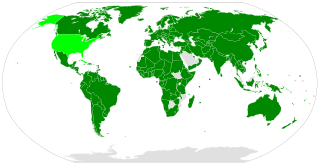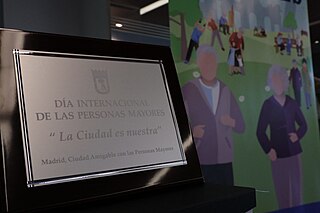
International development or global development is a broad concept denoting the idea that societies and countries have differing levels of economic or human development on an international scale. It is the basis for international classifications such as developed country, developing country and least developed country, and for a field of practice and research that in various ways engages with international development processes. There are, however, many schools of thought and conventions regarding which are the exact features constituting the "development" of a country.

The International Covenant on Economic, Social and Cultural Rights (ICESCR) is a multilateral treaty adopted by the United Nations General Assembly (GA) on 16 December 1966 through GA. Resolution 2200A (XXI), and came into force on 3 January 1976. It commits its parties to work toward the granting of economic, social, and cultural rights (ESCR) to all individuals including those living in Non-Self-Governing and Trust Territories. The rights include labour rights, the right to health, the right to education, and the right to an adequate standard of living. As of February 2024, the Covenant has 172 parties. A further four countries, including the United States, have signed but not ratified the Covenant.

The capability approach is a normative approach to human welfare that concentrates on the actual capability of persons to achieve lives they value rather than solely having a right or freedom to do so. It was conceived in the 1980s as an alternative approach to welfare economics.
Centesimus annus is an encyclical which was written by Pope John Paul II in 1991 on the hundredth anniversary of Rerum novarum, an encyclical issued by Pope Leo XIII in 1891. It is part of a larger body of writings, known as Catholic social teaching, which trace their origin to Rerum novarum and aim to relate the teachings of Jesus to the industrial age.

International Day of Persons with Disabilities is an international observance promoted by the United Nations since 1992. It has been observed with varying degrees of success around the planet. The observance of the Day aims to promote an understanding of disability issues and mobilize support for the dignity, rights and well-being of persons with disabilities. It also seeks to increase awareness of gains to be derived from the integration of persons with disabilities in every aspect of political, social, economic and cultural life. It was originally called "International Day of Disabled Persons" until 2007. Each year the day focuses on a different issue.

The right to education has been recognized as a human right in a number of international conventions, including the International Covenant on Economic, Social and Cultural Rights which recognizes a right to free, primary education for all, an obligation to develop secondary education accessible to all with the progressive introduction of free secondary education, as well as an obligation to develop equitable access to higher education, ideally by the progressive introduction of free higher education. In 2021, 171 states were parties to the Covenant.
World Refugee Day is an international day organised every year on 20 June by the United Nations. It is designed to celebrate and honour refugees from around the world. The day was first established on 20 June 2001, in recognition of the 50th anniversary of the 1951 Convention Relating to the Status of Refugees.
The Declaration on the Rights of Disabled Persons is a declaration of the General Assembly of the United Nations, made on 9 December 1975. It is the 3447th resolution made by the Assembly.

The Convention on the Rights of Persons with Disabilities is an international human rights treaty of the United Nations intended to protect the rights and dignity of persons with disabilities. Parties to the convention are required to promote, protect, and ensure the full enjoyment of human rights by persons with disabilities and ensure that persons with disabilities enjoy full equality under the law. The Convention serves as a major catalyst in the global disability rights movement enabling a shift from viewing persons with disabilities as objects of charity, medical treatment and social protection towards viewing them as full and equal members of society, with human rights. The convention was the first U.N. human rights treaty of the twenty-first century.

The International Day of Older People is observed on October 1 each year.

On 18 December 1990, the General Assembly adopted a resolution on the International Convention on the Protection of the Rights of All Migrant Workers and Members of Their Families.
The International Day of Families is observed on 15 May every year. The Day was proclaimed by the UN General Assembly in 1993 with resolution A/RES/47/237 and reflects the importance the international community attaches to families. The International Day provides an opportunity to promote awareness of issues relating to families and to increase knowledge of the social, economic and demographic processes affecting families.
The multilateral foreign policy of the Holy See is particularly active on some issues, such as human rights, disarmament, and economic and social development, which are dealt with in international fora.
In December 2009, the United Nations General Assembly adopted resolution 64/134 proclaiming the year commencing 12 August 2010 as the International Year of Youth.
The world's poor are significantly more likely to have or incur a disability within their lifetime compared to more financially privileged populations. The rate of disability within impoverished nations is notably higher than that found in more developed countries. Since the early 2010s there has been growing research in support of an association between disability and poverty and of a cycle by which poverty and disability are mutually reinforcing. Physical, cognitive, mental, emotional, sensory, or developmental impairments independently or in tandem with one another may increase one's likelihood of becoming impoverished, while living in poverty may increase one's potential of having or acquiring disability in some capacity.

The International Federation on Ageing is an international non-governmental organization founded in 1973 and based in Toronto, Ontario, Canada working in the field of ageing, older persons and ageing-related issues such as ageism, The intent of the organisation is for NGOs, the corporate sector, academia, government, and individuals working together to make, according to the IFA’s mission statement, a "change for older people throughout the world by stimulating, collecting, analyzing, and disseminating information on rights, policies and practices that improve the quality of life of people as they age". The IFA has General Consultative Status at the United Nations Economic and Social Council (ECOSOC).
Declaration of Mexico on the Equality of Women and their Contribution to Development and Peace 66/34 was a United Nations resolution that was adopted on July 2, 1975, at the close of the International Women's Year World Conference on Women held in Mexico City. The resolution was adopted to promulgate a set of principles concerning the equality of men and women. The Declaration called for action to immediately address the burdens and discrimination women experienced in the labor market, as primary childcare providers, and as political participants around the world.
The proposed Convention on the Rights of Older Persons (UNCROP) is likely to be the next major human rights treaty adopted by the United Nations. The proposed treaty will seek to remedy the fragmented human rights structure for Older Persons, and will focus on reaffirming critical human rights which are of concern to older persons. The focus of the treaty will be persons over 60 years of age, which is a growing demographic worldwide due to increased population ageing. The treaty follows from the success of the United Nations Convention on the Rights of the Child which has seen near universal acceptance since 1989. Where the UNCRC focuses on the rights of younger persons, the UNCROP will address those who form the older portion of society, who according to United Nations reports, are becoming increasingly vulnerable as a group without applicable normative standards of human rights law. Support for a Convention is becoming increasingly popular, as human rights groups including the Committee on Economic, Social and Cultural Rights (CESCR), HelpAge International, the Committee on the Elimination of Discrimination against Women, the International Labour Organization, and many other NGOs and states have expressed support for a universal instrument. A raising number of NGOs from across the world have joined forces in advocating for a Convention in the Global Alliance for the Rights of Older Persons (GAROP) which has been set up out of the need to strengthen the rights of older persons worldwide. With population ageing, the human rights of the growing number of older persons have become an increasingly important issue. Among the human rights issues faced by older persons are ageist attitudes leading to discrimination, exclusion and constraints on the legal capacity, autonomy and independent living of older people. Existing human rights violations have been further exacerbated and put on the spotlight by the COVID-19 pandemic. Older people have been denied access to health services and became prone to physical and social isolation. The stigmatisation of older people and ageist images of older persons have also become more evident. The debate surrounding the convention focuses on the implementation and safeguarding of older persons’ human rights aiming to set normative standards of human rights for older persons in an international legally binding instrument. An underlying common factor and root cause of many of human rights violations experienced by older persons, along with its ubiquitous, prevalent, and surreptitious nature, is ageism. Ageism, as defined by the World Health Organization, refers to the stereotypes, prejudice and discrimination towards others or oneself based on age. A UNCROP would go a long way to tackle ageism. Individual relationships generally fall outside of current human rights law, which seeks to present standards of relations between states and individuals. Therefore, it has been suggested that the proposed human rights convention for older persons ought to be drafted as an anti-discrimination convention. However, this would not be consistent with other multilateral human rights conventions such as the ICCPR and ICESCR which set normative standards.
The international human rights framework and domestic policy are the means by which the human rights of older people in New Zealand are protected. The key human rights issues facing older people in New Zealand encompass full participation within society, access to resources and a positive attitude to ageing.

The United Nations Framework Convention on Climate Change (UNFCCC), the Paris Agreement, the Sustainable Development Goals (SDGs), and the United Nations Convention on the Rights of Persons with Disabilities (CRPD) are connected through their common goals of addressing global challenges and promoting sustainable development through policies and international cooperation.









